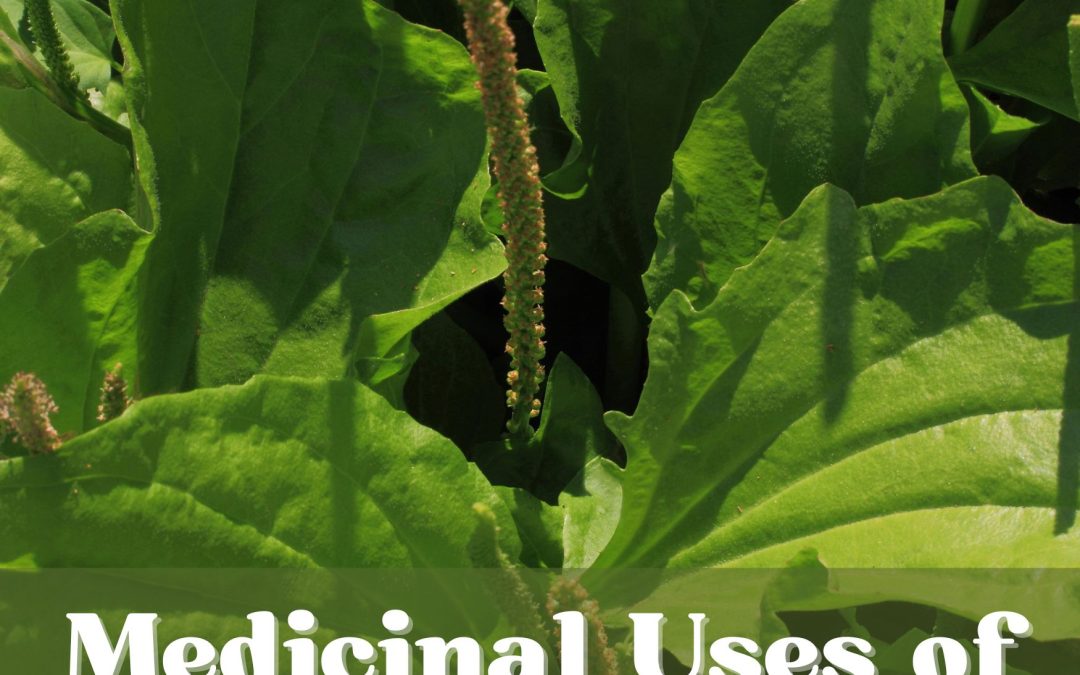This post may contain affiliate links, to learn more about them, check out our Disclosure.
Broadleaf Plantain (Plantago major) is often overlooked as a common weed, but this unassuming plant has been valued for its medicinal properties for centuries. Found in yards, gardens, and along roadsides worldwide, broadleaf plantain is a versatile herb with a long history of use in traditional medicine. In this blog post, we will explore the medicinal benefits, historical uses, and modern applications of broadleaf plantain, shedding light on why this plant deserves a place in your natural remedy toolkit.
What is Broadleaf Plantain?
Broadleaf plantain, also known as common plantain or greater plantain, is a perennial herb that belongs to the Plantaginaceae family. It is characterized by its broad, oval-shaped leaves that grow close to the ground and its small, inconspicuous flowers that appear on long stalks. Despite its modest appearance, broadleaf plantain is a powerhouse of medicinal benefits.
Medicinal Benefits of Broadleaf Plantain
- Wound Healing and Skin CareBroadleaf plantain is renowned for its wound-healing properties. The leaves contain bioactive compounds like allantoin, which promote cell regeneration and accelerate the healing of cuts, scrapes, and minor burns. Traditionally, the fresh leaves are crushed and applied directly to the skin to soothe insect bites, rashes, and stings, providing relief from itching and inflammation.
- Anti-inflammatory and Pain ReliefThe anti-inflammatory properties of broadleaf plantain make it an excellent natural remedy for conditions such as arthritis, gout, and joint pain. It contains flavonoids and tannins that help reduce inflammation and alleviate pain. Drinking a tea made from the leaves or applying a poultice to affected areas can provide significant relief.
- Respiratory HealthBroadleaf plantain has been used traditionally to support respiratory health. Its expectorant properties help clear mucus from the lungs and ease symptoms of bronchitis, colds, and coughs. A tea made from the leaves can be consumed to soothe a sore throat and reduce congestion.
- Digestive HealthBroadleaf plantain is also beneficial for digestive issues. It acts as a gentle laxative and can help soothe an irritated stomach lining, making it useful for conditions like gastritis and peptic ulcers. The mucilage content in the leaves creates a protective coating in the digestive tract, reducing inflammation and promoting healing.
- Antimicrobial PropertiesThe antimicrobial properties of broadleaf plantain make it effective against a variety of pathogens. It has been shown to combat bacteria, fungi, and viruses, making it a useful remedy for infections. The leaves can be used topically to treat minor wounds and prevent infection, or they can be brewed into a tea to support overall immune health.
- Blood Purification and DetoxificationIn traditional herbal medicine, broadleaf plantain has been used as a blood purifier and detoxifier. It helps the body eliminate toxins, supports liver function, and promotes overall health. Regular consumption of plantain tea can help cleanse the body and boost the immune system.
How to Use Broadleaf Plantain
- Topical Applications
- Poultice: Crush fresh broadleaf plantain leaves and apply them directly to wounds, insect bites, or skin irritations for immediate relief. Cover with a bandage if necessary.
- Salve: Create a soothing salve by infusing dried plantain leaves in oil and mixing it with beeswax. This can be used on dry skin, minor burns, and rashes.
- Internal Uses
- Tea: Brew a tea by steeping fresh or dried plantain leaves in hot water for 10-15 minutes. This tea can be consumed to support respiratory health, digestive health, and overall well-being.
- Tincture: A tincture made from broadleaf plantain leaves can be taken daily to support the immune system and reduce inflammation.
- Culinary Uses
- Salad Greens: Young broadleaf plantain leaves can be eaten raw in salads, adding a nutritious and slightly bitter flavor to your dish.
- Cooking: The leaves can also be steamed or sautéed like spinach and used in various recipes.
Broadleaf plantain is much more than a common weed. Its wide range of medicinal benefits makes it a valuable herb for natural health enthusiasts. From wound healing to supporting respiratory and digestive health, broadleaf plantain offers a natural and effective remedy for many common ailments. Whether used topically or consumed as a tea, this humble plant deserves a place in your herbal medicine cabinet.
So next time you spot broadleaf plantain growing in your yard, think twice before pulling it out. Instead, consider harvesting it for its medicinal benefits and incorporating it into your natural health routine.
Want to know how I use it? Check out how I infuse Plantain into an oil and make Itch Balm with it!

